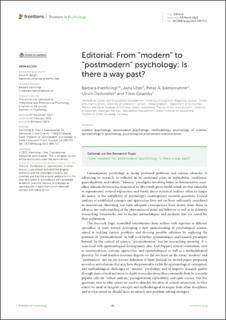Editorial: From “modern” to “postmodern” psychology: Is there a way past?
Peer reviewed, Journal article
Published version
Permanent lenke
https://hdl.handle.net/11250/3065800Utgivelsesdato
2023Metadata
Vis full innførselSamlinger
Originalversjon
Hanfstingl, B., Uher, J., Edelsbrunner, P. A., Dettweiler, U., & Gnambs, T. (2023). From “modern” to “postmodern” psychology: Is there a way past?. Frontiers in Psychology, 14. 10.3389/fpsyg.2023.1091721Sammendrag
Contemporary psychology is facing profound problems and various obstacles to advancing its research, as reflected in its continued crises in replicability, confidence, generalizability, and validity. “Modern” paradigms–involving beliefs in determinative cause-effect relations between the elements of an objectively given world, which are thus amenable to experimental, rational exploration and mostly linear statistical analyses–often no longer do justice to the complexity of psychology's contemporary research questions. Critical analyses of established concepts and approaches have not yet been sufficiently considered in mainstream theorizing nor have adequate consequences been drawn from them to advance our understanding of the phenomena of mind and behavior as well as to elaborate overarching frameworks and to further methodologies and methods that are suited for their exploration.

